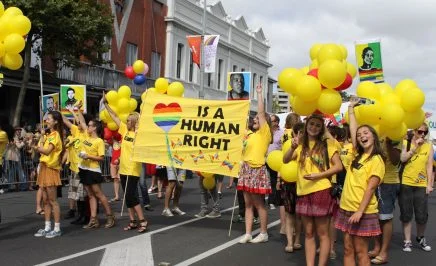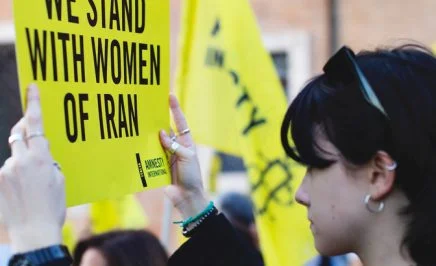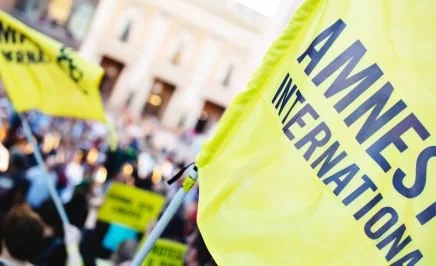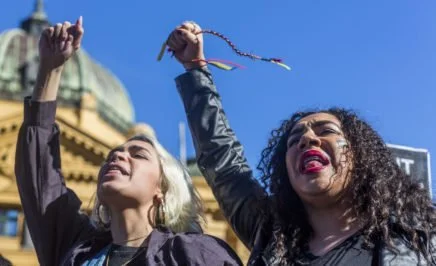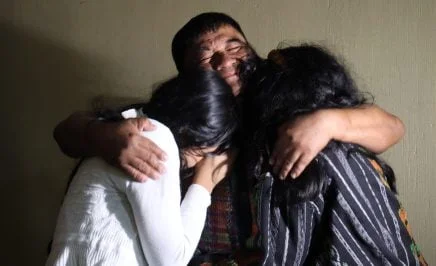Every signed petition and donation has a human rights impact. When we hand your signature along with thousands of others to decision-makers or when you power our critical human rights work by donating, you make a difference to people’s lives.
Here’s a snapshot of our collective impact over the last six months — the latest stories of hope overcoming adversity and lives changed.
Refugee rights in Australia: Longstanding injustice of temporary protection visas ended for refugees
In February 2023, following years of campaigning, the Australian government finally announced 19,000 people, who have lived in limbo for as long as 10 years under the cruel and unnecessary system of temporary protection visas, can become permanent residents and reunite with their families. This will enable them to see their families, study, travel and participate fully in Australian life.
What’s next?
- Learn more about our refugee rights campaign work.
- The refugee crisis in 2023 is relentless – more than 100 million people are displaced globally. We need to continue to be relentless in our support for refugees who are seeking safety and freedom. Sign the petition to raise the refugee and humanitarian intake in Australia.
Climate justice in Australia: UN adopts landmark Pacific-led resolution to bring climate change
In March 2023, after tireless advocacy by students from the Pacific supported by thousands of Amnesty activists and other civil society organisations, Australia became one of 132 countries to co-sponsor Vanuatu’s initiative to take climate change to the International Court of Justice. This is a landmark moment in the fight for climate justice as it means the court will give a legal opinion on the obligations of governments to protect the human rights of present and future generations against the effects of climate change.
“To see Australia and nations around the world standing with Vanuatu and Pacific civil society, who from the frontlines of the climate crisis have brought this campaign to the world’s highest court, signals unprecedented global recognition that the human rights consequences of climate inaction must be addressed.”
Rose Kulak, Amnesty International Australia campaigner
Over 6,000 people called on the Australian government to be a co-sponsor.
What’s next?
- Learn more about our climate justice campaign work.
- Uncle Pabai and Uncle Paul’s ancestors have lived on islands of the Torres Strait, the northernmost part of Australia, for thousands of years. Now their whole way of life – which as Indigenous peoples is deeply connected to land, sea and sky – is at risk because of climate change. If the islands become uninhabitable, they will be forced to break these connections and leave their homelands. Sign the petition to call on the Australian government to take urgent climate action.
Indigenous justice in Australia: The ACT is raising the age
In May 2023, following a campaign by activists and organisations including Amnesty, the ACT tabled legislation to raise the age of criminal responsibility from 10 to 12 years old, and eventually raise the age to 14 in July 2025. It’s a step in the right direction but still not enough – children accused of ‘serious offences’ will continue to be subject to police investigation including strip-searches, being dragged through courts, and locked in prisons.
Since 2018, Amnesty has campaigned to raise the age of criminal responsibility to at least 14. In August 2022, alongside our coalition partners in Change the Record, Amnesty handed over close to 210,000 signatures from everyday Australians calling to raise the age.
What’s next?
- Learn more about our Indigenous justice campaign work.
- Sign the petition to support keeping our kids safe from prison and out of the criminal justice system for good. Call on the government to invest in community-based solutions that work.
LGBTQIA+ rights in Australia: Queensland allows identity documents to reflect people’s gender
In June 2023, Queensland passed new laws that remove barriers to updating birth certificates. The newly passed laws mean transgender, non-binary and gender diverse people will no longer be forced to undergo invasive “sex reassignment surgery” before being able to correct their gender identity documents.
These reforms mean the identity documents of trans and gender-diverse Queenslanders finally reflect their gender – something that should be the case for every human being. It’s incredible news for Amnesty Australia’s Queensland LGBTQIA+ network who are working closely in partnership with other local organisations in the fight for LGBTI rights.
What’s next?
- Learn more about our LGBTQIA+ rights campaign work.
LGBTQIA+ rights in Iran: Activist Sareh’s death sentence overturned
In March 2023, Iranian activist Zahra Sedighi-Hamadani, known as Sareh, was released on bail after serving more than a year behind bars. She was sentenced to death after speaking out in support of LGBTQIA+ rights on social media and in a BBC documentary. 46,000 Amnesty supporters rallied for her justice, calling on Iranian authorities for her immediate release.
“I hope to achieve freedom… I hope the day will come when we can all live in freedom in our country.”
Zahra Sedighi-Hamadani
What’s next?
- Learn more about our LGBTQIA+ rights campaign work.
- Brave people like Sareh stand up for LGBTQIA+ rights despite facing extreme discrimination, torture and unjust charges. Currently in Iran, they face systematic violence, persecution, and discrimination. Sign the petition to call on Iranian authorities to release others at risk of execution for courageously standing up and exercising their right to protest.
LGBTQIA+ rights in Taiwan: Same-sex marriages and adoption recognised
In February 2023, Taiwan announced it would recognise same-sex marriages between its citizens and their foreign partners, even if a partner’s home country doesn’t allow it. It also passed legislation for equal adoption rights for same-sex couples.
Amnesty International Taiwan has been working closely with local groups to campaign and secure wider LGBTI rights. These are major steps in the move towards equality after Taiwan became the first in Asia to legalise same-sex marriage in 2019.
What’s next?
- Learn more about our LGBTQIA+ rights campaign work.
Women’s rights in Iran: Yasaman and her mother Monireh were released from prison early
In February 2023, Yasaman Aryani and Monireh Arabshahi were released from prison after serving four years of their 16-year sentence. They were arbitrarily imprisoned in 2019 for speaking out against Iran’s discriminatory forced veiling laws.
The death in custody of 22-year-old Mahsa Amini at the hands of Iran’s “morality” police last year sparked an unprecedented uprising that continues to this day.
Yasaman’s story was part of Amnesty’s Write for Rights campaign in 2019. An incredible 100,000 supporters in Australia and over one million supporters around the world signed a petition, speaking out, maintaining pressure, and demanding justice. Amnesty’s research, campaigning and advocacy work continues to have a positive impact on the lives of women rights activists imprisoned in Iran.
Watch as Yasaman is reunited with her sister:
What’s next?
- Learn more about our women’s rights campaign work.
- This staunch resistance of women and girls spans decades. For her advocacy on empowering women and girls, Iranian-Kurdish Zeynab has spent the last 15 years behind bars, where she’s currently serving a life prison sentence. Sign the petition to stand in solidarity with women and girls in Iran, and call for Zeynab’s immediate release.
Holding authorities to account in Australia and New Zealand: Attempt at sportswashing Saudi Arabia’s human rights records for Women’s World Cup denied
In March 2023, FIFA confirmed that Visit Saudi would not sponsor the 2023 Women’s World Cup in Australia and New Zealand – a huge win for all activists, and current and former players who have spoken out for human rights. This decision proves human rights do matter in sport.
What’s next?
- Sign the petition to hold FIFA accountable by compensating the hundreds of thousands of migrant workers who have suffered human rights abuses, and the families who have lost their loved ones. We cannot change the past – but FIFA can change the future.
Individuals at risk in Vietnam: Australian citizen Mr Chau freed from prison
In July 2023, Chau Van Kham, a Vietnamese-Australian pro-democracy activist and retired Sydney baker, was freed from Vietnamese prison. He was detained in Vietnam within hours of arriving in Vietnam and sentenced to 12 years in prison for being a member of the political party, Viet Tan.
“Today is a momentous day for the movement to free wrongly imprisoned people around the world, and serves as a reminder that Australians in their tens of thousands will take action to defend human rights.”
Rose Kulak, Amnesty International Australia campaigner
Prison conditions in Vietnam are notoriously harsh – poor food quality, lack of drinking water and the absence of adequate medical treatment. After years of advocacy and over 39,000 actions – online and through the mail – directed at Vietnamese authorities, Mr Chau has been released and reunited with his family in Australia.
What’s next?
- Learn more about our right to protest and individuals at risk campaigns.
Individuals at risk in Africa: Cecillia and Joanah acquitted of ‘faking’ their own abduction
In July 2023, Cecillia Chimbiri and Joanah Mamombe were acquitted after being accused of ‘faking’ the traumatic abduction they survived. They were abducted and arrested following a peaceful protest about the government’s failure to provide social protection during the Covid-19 pandemic.
Their story was a part of Amnesty’s Write for Rights 2022 campaign in support of brave individuals from around the world who all paid a price for speaking truth to power. 10,000 Amnesty supporters in Australia, and over 500,000 globally, took action in support of Cecillia and Joanah and rallied for their justice. Amnesty International Zimbabwe further supported through trial observation and mobilising local and international solidarity for them.
The right to freedom of expression and peaceful assembly is a fundamental human right enabling peaceful protests – and it’s the role of government and security forces to protect this right.
What’s next?
- Learn more about our right to protest, Write for Rights and individuals at risk campaigns.
- When courageous people protest, they make the world a better place. Sign the petition to take the torture out of protest – protesting should never cost you your life.
Individuals at risk in Iran: Aid worker Olivier released from prison
In May 2023, Belgian aid worker Olivier Vandecasteele was freed after being unjustly sentenced to 40 years in prison and 74 lashes, convicted of espionage in a closed-door trial in Iran. During his time in detention, he was tortured, isolated and denied healthcare.
Over 27,000 Amnesty supporters in Australia took action and challenged injustice. Thousands of people called on Iran’s Head of Judiciary to reveal Olivier’s whereabouts and release him from unjust imprisonment.
Olivier’s release is more than welcome, but it consisted of a prisoner swap. The Iranian authorities are known to take foreigners hostage for leverage. We’ll continue to campaign to ensure the Iranian authorities are held accountable for their human rights abuses, including the act of hostage-taking.
What’s next?
- Learn more about our individuals at risk campaigns.
Individuals at risk in Yemen: Four journalists’ death sentences have been quashed
In April 2023, four journalists facing the death penalty in Yemen simply for telling the world the truth were finally released – after more than seven years in detention and three years on death row. Akram, Abdelkhaleq, Hareth and Tawfiq were first arrested back in 2015 for their work exposing the truth about suffering in Yemen.
Over 43,000 Amnesty Australia supporters took action calling for their release. They should’ve never been arrested in the first place. Thanks to supporters, today they are free.
Every day, journalists around the world face intimidation, imprisonment and violence, for reporting on human rights violations. No one should be sentenced to death just for doing their job.
What’s next?
- Learn more about our death penalty, right to protest and individuals at risk campaigns.
Individuals at risk in Bangladesh: Journalist Shamsuzzaman released on bail
In April 2023, after being arrested for covering the impact of the cost-of-living crisis in Bangladesh, Shamsuzzaman Shams’ bail application was successful.
He was charged under Bangladesh’s Digital Security Act, which is frequently used to silence dissent and target critical voices, including journalists who publish online. If convicted, he faces up to seven years in prison – a blatant violation of the right to freedom of expression.
Amnesty rallied support, issuing an urgent action demanding his release. We have also campaigned against the Digital Security Act, publishing research about the way it’s been weaponised by the authorities. We’ll continue to campaign for all charges against Shamsuzzaman to be dropped.
What’s next?
- Learn more about our individuals at risk campaigns.
Amnesty International is a global movement of 10 million people standing up for justice, freedom and equality. Together, our voices challenge injustice and are powerful enough to change the world. Find out more about what we do, our impact and our current campaign cases.

